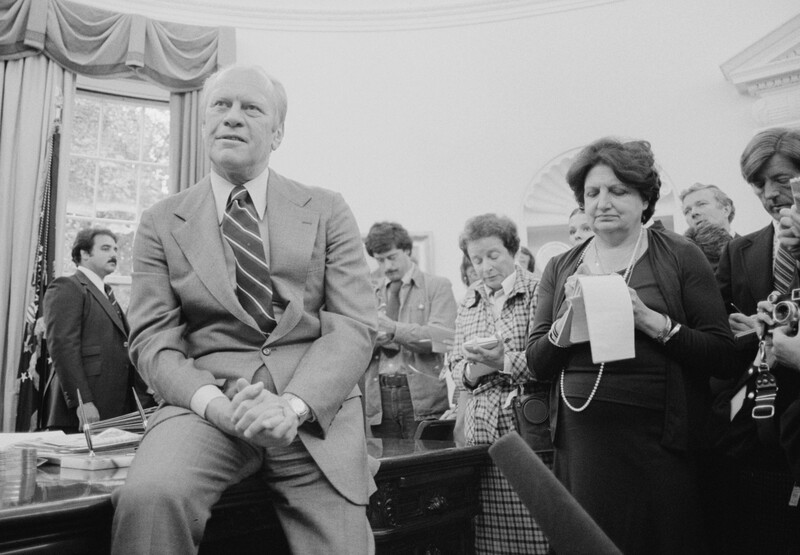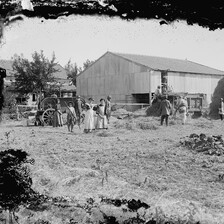The Electronic Intifada Washington, DC 26 July 2013

Helen Thomas at a White House press conference with President Gerald Ford, 1976.
Library of CongressHelen Thomas’ life was a relentless search for the truth, without fear or favor. It was her calling, profession and duty.
She loved being a journalist, and she strived daily to deliver accurate news to the American people. “If your mother says she loves you,” she was fond of saying, “get a second opinion.”
Helen burned with outrage at injustice. As the daughter of Lebanese immigrants, she was at the receiving end of racism and discrimination growing up in Detroit.
The memory of slurs hurled at her as a child still stung. She decried the racism and segregation she found in Washington, DC in the 1940s, arriving as a young ambitious reporter.
But she was gratified to eventually witness the civil rights transformation, covering Martin Luther King Jr’s march on Washington, and thrilling to Marion Anderson singing at the Lincoln Memorial.
She pushed fearlessly into the male-dominated press corps, enlisting Presidents John F. Kennedy and Lyndon B. Johnson to help advance women in journalism and government. Unpretentious, Helen encouraged young journalists and supported their careers, remaining approachable with a common touch.
She admired the first ladies as women of character and thought they all served the country well — sometimes better than their husbands.
“Unnecessary war”
Helen questioned ten presidents during her career. They didn’t like it. She didn’t care. When she was moved to the back of the White House pressroom and her questions ignored, she remained tenacious in seeking the truth. She minced no words.
Operation Iraqi Freedom, she wrote in her book Watchdogs of Democracy, was “an unnecessary war that has cost thousands of lives of innocent civilians, American and foreign military, and journalists,” noting that the alleged “weapons of mass destruction were never discovered.”
On television, challenging the president of the United States — the most powerful man in the world — Helen seemed ten feet tall to me. In reality, she was petite. “How tall are you, Helen?” I asked one day. “Five foot three — and a half,” she exclaimed.
“How then did you learn to ask such big questions?” I queried. “I ask big,” she replied, “for the American people.”
Integrity
Helen had great integrity and believed the media was important to protect and preserve democracy. “Let the people know the facts and the country will be safe,” she would say, quoting Abraham Lincoln.
She found the current media’s lack of fight against “the manipulation of government officials who play the fear card” astounding. She lamented that so many “reporters became stenographers instead of interrogators.” Passionately anti-injustice, Helen believed she had to speak for those who had no voice.
For Helen, that meant speaking out about the Middle East conflict. Ironically for someone who had defended the freedom of the press all her life, furor over her poorly worded comments forced her to retire.
In time, however, her critics will find that Helen correctly evaluated the injustice of the conflict, and not because she was biased, but because she was an excellent journalist and had verified the facts.
She knew that Israeli forces expelled the overwhelming majority of the indigenous Palestinians from their homeland during the Nakba — catastrophe — of 1948, and later the 1967 war. She remained outraged at Israel’s ongoing oppression of the Palestinians.
As the dean of the White House press corps, “Thank you, Mr. President,” was Helen’s signature close to presidential press conferences for so many years. America has lost a national treasure, a vigilant watchdog of democracy, a truth seeker, and a proud patriot. Thank you, Ms. Helen Thomas.
You will be well remembered by your profession, by this nation, and throughout the world for your courageous stand for truth and justice. You have fought the good fight, and you have finished the race.
Rosemarie M. Esber is co-producing a documentary of Helen Thomas’ life.





Comments
Helen Thomas
Permalink Francis Collins replied on
Hello electronicintafada.net,
I love getting your stories about Palestine and am a supporter of the Palestinian cause. I'm gay and belong to a group called Quit, that stands for queers undermining Israeli terrorism. We used to have a saying in the sixties and that was, "question authority" and with so much of the corporate media kissing up to power we have lost one of the last vestiges of true democracy and that was what Helen Thomas was about confronting power and the lies that were told to justify war and occupation. She was a true hero for the truth and I will miss her deeply.
Francis Collins
Lost her nerve
Permalink Gart Valenc replied on
I admire her work, but was thoroughly disappointed when she apologised for saying Zionists are occupiers & should go home:
http://www.youtube.com/watch?v...
I would have thought that at her age (90'ish) and after such an illustrious career, she had enough credibility to take the bull by its horns, as it were, and continue making the case for Palestinians rights with her usual intensity and conviction. Instead, she lost her nerve. What a pity!
Gart Valenc
Twitter: @gartvalenc
Gart
Permalink John Costello replied on
Clearly you have no knowledge of nor respect for old age. I would say you do fit in!
Helen Thomas
Permalink John Costello replied on
Thank you EI for offering this simple but genuine eulogy for a great woman of character. It is like fresh water in the cesspool of mainstream hypocrisy.
Her colleagues threw her under the bus, knowing she was right, had earned the right to speak her mind and was stripped of the life she loved because of one unguarded moment in an infuriating situation. The truth is; the truth isn't welcome in this country.
It just doesn't fit in.
Helen Thomas
Permalink mark replied on
No one unwilling to crawl to the zionists gets to her position in the US media.
And even when you've crawled to them for decades, ONE time speaking up, even in a one on one coversation,is enough to get you banned, permanently!
That's the lesson of her career.
And it's not much better even for non-media people who speak out publicly--you can pretty much write off your career.
MUST READ: LAWRENCE DAVIDSON ON THOMAS AND AIPAC...
Permalink Peter Loeb replied on
I urge you to read with care Lawrence Davidson's analysis on Helen Thomas.
It is on his webbsite :
www.tothepointanalyses.com